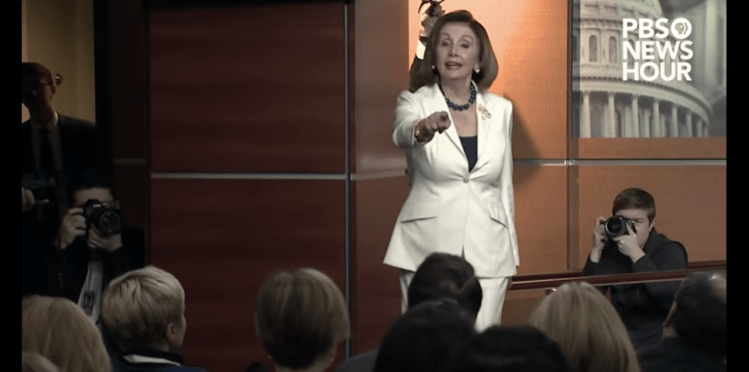Love Factually: The ‘Don’t Mess with Me’ Clip of 2019
Amid all the toxicity, an impromptu clapback in Washington provides a political moment of — gasp — truth and love.

Lisa Van Dusen/For the Hill Times
Dec. 11th, 2019
I’m not here to settle the annual debate over whether Love Actually is an endearing yuletide treacle or an insidious hottie fruitcake of primeval patriarchal prerogative. I once worked for an Israeli-Palestinian peace building program and even I wouldn’t venture into that Twitter tar pit.
Whatever your view on its other merits, the 2003 Richard Curtis film did produce one of the most indelible political scenes since Jimmy Stewart’s “lost causes” soliloquy in Mr. Smith Goes to Washington. No, not Hugh Grant dancing through Number 10 like nobody’s watching — though also a classic. The scene in which he ditches the talking points in a joint presser with Billy Bob Thornton’s predatory President of the United States and enumerates the arrows in Britain’s soft-power quiver — including Shakespeare, Churchill, the Beatles and both of David Beckham’s feet — to check his interlocutor’s asymmetry arrogance. To a former prime ministerial press aide and reporter who’s snoozed through the boilerplate of innumerable joint-leader newsers, that scene was way swoonier than Andrew Lincoln’s lovestruck stalker cue-card bit or Colin Firth’s adorably garbled Portuguese proposal.
The Love Actually political moment of 2019 did not, as one might have expected, arrive in a joint, pre-UK election NATO presser last week starring the Rodney Dangerfields of performative politics. Boris Johnson did not fake-stand up to Donald Trump during the NATO 70th by listing all the attributes of British culture — from Harry Styles to Stormzy to Phoebe Waller-Bridge — that make it a force to be reckoned with beyond its percentage-of-GDP spent on defence. In fact, he fake-avoided him like an irate real ex-girlfriend.
The Love Actually political moment of 2019 was delivered by House Speaker Nancy Pelosi, in a solo presser in Washington last week. Pelosi was asked whether she hates Trump and that’s why he’s being impeached — as though hatred were a prerequisite for decrying the actions of a man who has reality-showed the presidency beyond recognition.
“This is about the Constitution of the United States and the facts that led to the President’s violation of his oath of office. And as a Catholic, I resent your using the word ‘hate’ in a sentence that addresses me. I don’t hate anyone,” she told a representative of the conservative Sinclair Broadcasting, adding with the petrifying tone of a woman who once wrangled five children under the age of six, “So, don’t mess with me when it comes to words like that.”
After three years during which the purveyors of democracy-discrediting scenery chewing have been simultaneously obliterating norms and exploiting them for tactical purposes, Pelosi’s response made a point about the limits of both reflexive decorum and propaganda posing as journalism. As a moment of truth, it cut through the cloud of Trumpian echo chamber farce like a foghorn.
Most interestingly, Pelosi also used a word that generally doesn’t make the daily Washington tag cloud: love. “I was raised in a way that is…’a heart full of love’… and always pray for the president,” she said.
In this moment when hatred is being fueled and amplified by interests who require division to conquer, love tends to get drowned out. So, Pelosi’s act of countering hate with love was more than just a viral moment. Martin Luther King Jr.’s conceptualization of agape, or universal love, as key to nonviolent resistance didn’t come with an asterisk. It wasn’t “Love your enemies (except the ***holes).”
A lot has happened since 2003. Donald Trump is degrading America, Brexit is downgrading Britain and Hugh Grant is now real-campaigning against the chaos and corruption that have enabled both.
And Love Actually, despite its cringe-y pre-#MeToo bits, is still beloved.
Lisa Van Dusen is associate editor of Policy Magazine and a columnist for The Hill Times. She was Washington bureau chief for Sun Media, international writer for Peter Jennings at ABC News, and an editor at AP in New York and UPI in Washington.
